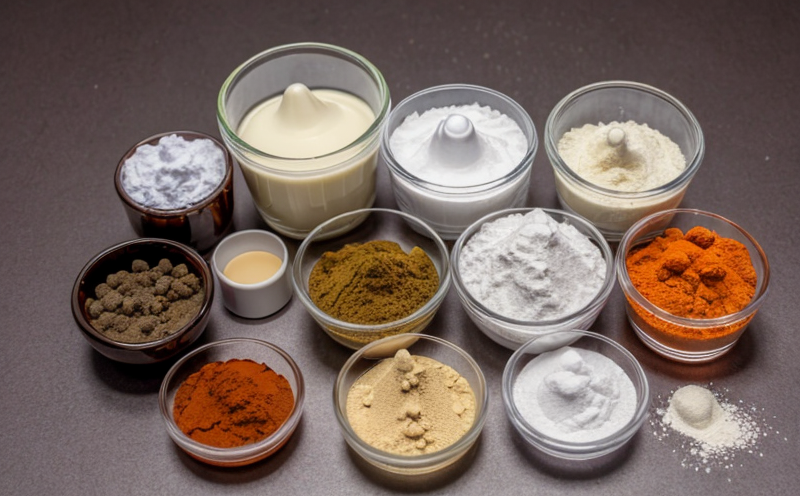Brookfield Viscometer Viscosity Testing
Brookfield viscometers are widely used in pharmaceutical testing to measure the viscosity of excipients and formulation ingredients. This service is crucial for ensuring product quality, consistency, and compliance with regulatory standards such as ISO, ASTM, and FDA guidelines.
The Brookfield viscometer operates on different types of rheometers that can be configured to perform various tests including shear, extensional, and oscillatory measurements. These tests provide critical insights into the flow behavior of excipients under dynamic conditions, which is essential for optimizing formulation design and ensuring stability during manufacturing processes.
Excipients play a vital role in pharmaceutical formulations by providing physical form, improving dissolution properties, controlling release rates, enhancing stability, and acting as binders. The viscosity testing ensures that the excipient's flow characteristics meet the required specifications, thereby impacting the overall quality of the final product.
The Brookfield viscometer can handle a wide range of sample types from Newtonian fluids to complex rheological materials like suspensions and emulsions. This versatility allows for comprehensive evaluation of different excipients used in solid dosage forms such as tablets, capsules, and powders.
In the context of pharmaceutical testing, viscosity measurements are particularly important because they influence how easily a substance flows through processing equipment or packaging systems. Understanding these properties helps manufacturers avoid potential issues like caking, sticking during compression processes, and poor flowability in granulation steps.
The test procedure involves preparing the sample according to specified procedures outlined by relevant standards such as ISO 3214 for capillary viscometers or ASTM D445 for cone-and-plate viscometers. Once prepared, the samples are placed into appropriate measuring cells within the Brookfield viscometer system.
The machine then applies controlled shear stress to the sample while monitoring its response over time. Data collected includes both absolute viscosity values (measured in centipoises or poise) and apparent viscosity values which reflect how the material behaves under changing conditions such as temperature changes or varying rotational speeds.
For extensional tests, the Brookfield viscometer can also measure elongational viscosity—a key parameter for assessing thixotropic behavior. Thixotropy describes a substance's tendency to become less viscous when subjected to shear stress and then recover its initial high viscosity once the stress is removed.
The results from these tests are used by quality managers, compliance officers, R&D engineers, and procurement teams to make informed decisions regarding excipient selection, process optimization, and formulation adjustments. By adhering strictly to defined acceptance criteria established by regulatory bodies like FDA or EMA, pharmaceutical companies can ensure consistent product performance across batches.
Furthermore, understanding the rheological properties of excipients through thorough viscosity testing allows for better control over manufacturing processes which ultimately leads to improved drug product quality and patient safety. This information is particularly valuable when developing new formulations or scaling up existing ones from small-scale laboratory settings to large commercial production lines.
Benefits
- Ensures compliance with industry standards such as ISO, ASTM, and FDA guidelines
- Provides detailed insights into the flow behavior of excipients under dynamic conditions
- Aids in optimizing formulation design by identifying optimal excipient combinations for specific applications
- Enhances process efficiency by minimizing issues related to caking, sticking during compression processes, and poor flowability in granulation steps
- Promotes consistency across batches through strict adherence to defined acceptance criteria
- Supports innovation in drug development by providing valuable rheological data that can be used for designing novel formulations or improving existing ones
Eurolab Advantages
EuroLab offers state-of-the-art Brookfield viscometer systems operated by highly skilled and experienced technicians who possess deep knowledge of both the equipment itself as well as its application within pharmaceutical testing. Our facilities are equipped with cutting-edge technology that guarantees accurate measurements every time.
We pride ourselves on offering not only precise results but also comprehensive support throughout your testing journey from initial consultation to final report delivery. With our team's expertise, you can rest assured knowing that each test is conducted according to best practices ensuring reliability and reproducibility of the data produced.
Moreover, EuroLab understands the importance of timely turnaround times in today’s fast-paced industry environment. We strive to deliver results within agreed upon deadlines so that our clients have access to critical information promptly allowing them to make quick decisions regarding their projects.
Use Cases and Application Examples
| Excipient Type | Description | Application Example |
|---|---|---|
| Silica-based excipients | Used as diluents, fillers, and absorbents in tablets and capsules. | Incorporated into enteric-coated tablets to control dissolution rate. |
| Magnesium stearate | A common lubricant used during tableting processes to prevent sticking. | Ensures smooth operation of manufacturing equipment during compression steps. |
| Hydroxypropyl cellulose (HPC) | An excipient known for its film-forming properties used in coating applications. | Forms a protective barrier around tablets to enhance shelf life. |





